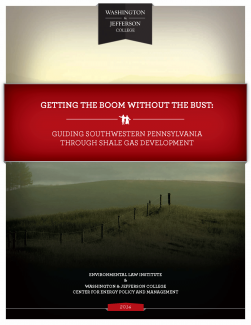Getting the Boom Without the Bust: Guiding Southwestern Pennsylvania Through Shale Gas Development

Shale gas development has raised concerns that local governments might be entering a “boom and bust” cycle. This study examines the gas boom in Pennsylvania’s Marcellus Shale, and explores best practices to forestall or mitigate a subsequent economic downturn or “bust.” A key focus of the study is the distribution and expenditure of state impact fees assessed on the gas industry.